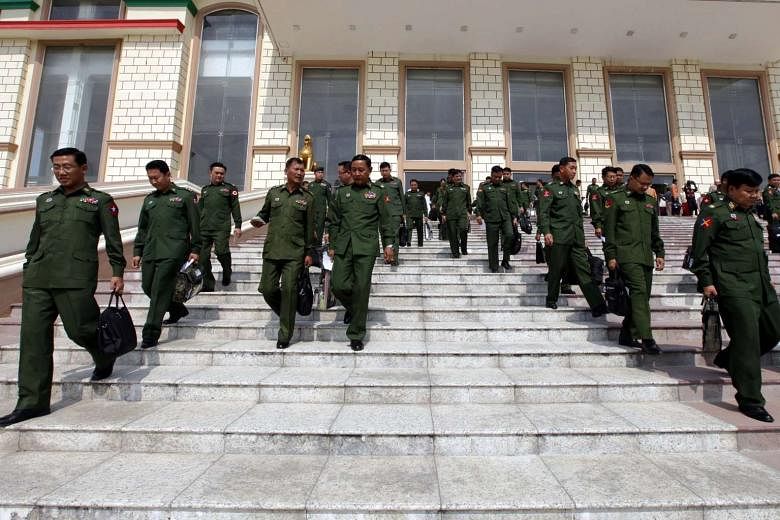NAYPYITAW (Reuters) - A deepening rift has opened between Myanmar's powerful military and Ms Aung San Suu Kyi, sources say, threatening the democracy leader's prospects for forming a successful government even as Parliament prepares to nominate presidential candidates on Thursday (March 10).
With the date fast approaching for Ms Suu Kyi's National League for Democracy (NLD) to take power, efforts to portray the party and its former foes as working cordially together towards a smooth transfer of power have faltered, according to politicians and officials familiar with the situation.
"She believed that she would be able to work with the military, but after the last meeting with the commander-in-chief, she realised that she cannot negotiate with them," said a senior NLD Upper House lawmaker briefed on the talks. "It's quite clear that she has moved on from waiting for the military to collaborate."
Talks between the NLD and the military began soon after Ms Suu Kyi's party won a landslide victory in a historic election on Nov 8, heralding the country's first democratically elected government since the military took power in 1962.
But Ms Suu Kyi has become frustrated with the intransigence of the military on issues ranging from a constitutional amendment that would allow her to become president to the location of the handover ceremony before the start of the new government on April 1, say sources in her camp.
General Tin San Naing, the spokesman for military MPs, declined to comment on the details of negotiations.
The military has stressed its belief that it has a vital role to play in politics until the transition to democracy is secure, and had worried that changing the Constitution quickly could set a dangerous precedent.
Myanmar's junta handed power to a semi-civilian government made up of former generals in 2011, after nearly 50 years of military rule, but the Constitution it drafted left the military with considerable power.
As well as a clause that effectively bans Ms Suu Kyi from becoming president because her children are British citizens, the Constitution also gives the military three powerful ministries and 25 per cent of the seats in Parliament that amounts to a veto over any constitutional change.
The charter, which leaves the security apparatus and much of the state bureaucracy under military control, will force the NLD government to work with the armed forces.
Underscoring the antipathy between the two sides, an official who met Ms Suu Kyi recently said the bickering had extended beyond the Constitution and powersharing to small details such as car parking slots at the handover ceremony and equipment removed from offices by outgoing government staff.
The tensions boiled over in Parliament two weeks ago in a rare show of dissent by military MPs, who stood up to protest against accusations by NLD parliamentarians that the outgoing administration had mishandled public projects.
"We were scared when the military MPs suddenly stood up against our MP's proposal... my heart just dropped when I turned around to check the noise. The situation was really tense," said Mr Tint Soe, a Lower House NLD lawmaker.
The stand-off in Parliament came about a week after the third meeting between Ms Suu Kyi and General Min Aung Hlaing, the powerful army chief.
"The army came to the negotiating table with a long shopping list of demands that proved unfeasible," said Mr Win Oo, a former member of the army-backed Union Solidarity and Development Party (USDP), who closely monitors the transition. "The two sides are now in the state of cold war. It's a political killing field."
The NLD had hoped the military could be persuaded to endorse a constitutional amendment allowing Ms Suu Kyi to become president.
But as it became clear late last month that was not going to happen, the Nobel Peace Prize laureate decided to cut short the negotiations and bring forward by a week the process for selecting a proxy president - who will run the country at her behest.
The NLD has yet to say who that will be. Most of the speculation has centred on candidates who have a low profile and will be loyal to the party leader.
On Thursday, the Upper House and lower houses of Parliament, and the military block in the legislature, will each nominate a candidate.
The joint chamber will vote on which of the three becomes president - and the NLD boasts a big enough majority to carry the vote no matter which way the military votes.
It has been unclear how quickly after Thursday's nominations the joint session vote will be held. A director from the Parliament told Reuters on Wednesday that the vote would not take place until Monday.
The losing candidates will become vice-presidents. For some in the NLD, contemplating the end of a long wait to form a government, the wrangling over the transition is a grim portent.
"It will be really difficult for her in the future because of the military - it is very clear they don't want to cooperate," Mr Tint Soe, the NLD lawmaker said. "It's such a miserable situation."

